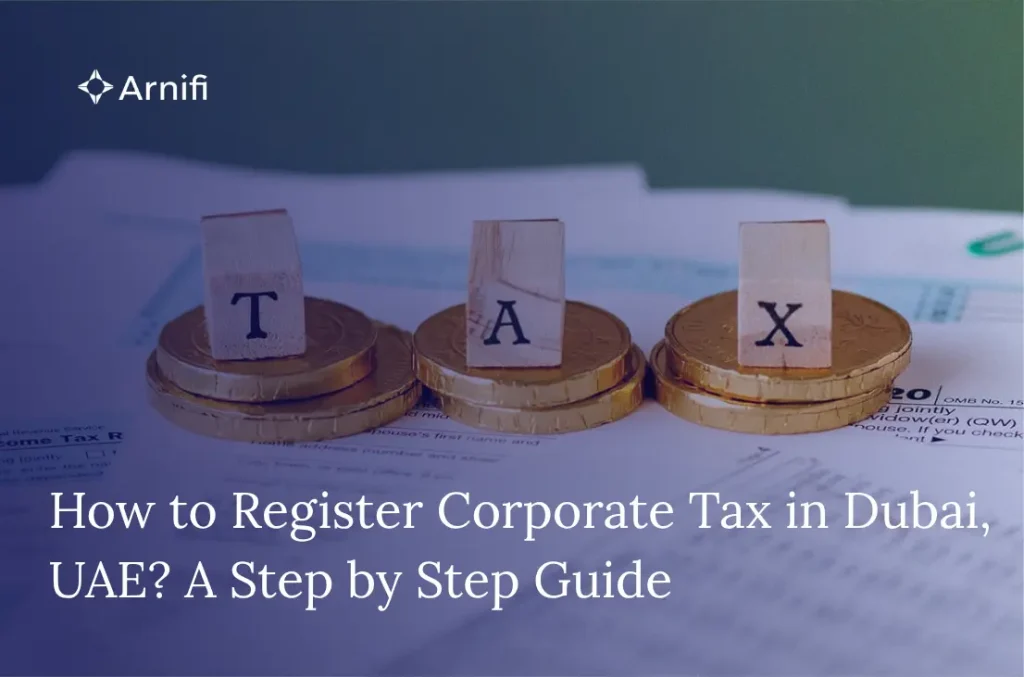How to Register Corporate Tax in Dubai, UAE? A Step by Step Guide
by Shethana Nov 20, 2025  6 MIN READ
6 MIN READ

Corporate tax has become a mandatory part of the UAE finance calendar. So, how to register corporate tax in Dubai, UAE?
Table of contents
- What is Corporate Tax?
- Who Must Register for Corporate Tax in UAE?
- When to Register for Corporation Tax?
- What is Required for Corporate Tax Registration in UAE?
- Document Checklist
- How to Register for Corporate Tax in UAE?
- What to Manage After Registration?
- Common Mistakes to Avoid While Registering for Corporation Tax
- How Arnifi Helps With Corporate Tax Registration in Dubai?
- FAQs
Registration can be done at EmaraTax. It runs on verified legal data, and links directly to accounting records that later drive computations and filings.
By 2025 more than 640,000 businesses had registered for corporate tax in the UAE, so clean ledgers and documented transactions now provide accurate computations and on-time returns.
For a detailed step-by-step process, read this guide to know the scope, timelines, portal actions, evidence, and post-registration controls so finance heads can complete registration in an organized way and keep the file audit-ready.
What is Corporate Tax?
The corporate tax law in UAE applies to most juridical persons incorporated in the country, with specific rules for free zone persons and defined cases for non-residents that create a nexus.
The headline rate is 0% on taxable income up to AED 375,000 and 9% on income above that level, with a 15% domestic minimum top up tax for large multinational groups.
Taxable income starts from accounting profit and is adjusted by law and related decisions. Clean ledgers and documented transactions remain the first control for correct computations and smooth returns.
Who Must Register for Corporate Tax in UAE?
Corporate tax registration in Dubai, UAE is required for:
- UAE-incorporated companies and other juridical persons.
- Free zone entities that plan to claim preferential treatment or that expect non-qualifying income.
- Foreign entities with a permanent establishment or other nexus as defined by guidance.
Important Advice: Branches of a UAE legal entity typically register under the parent. Each group should still map the legal structure before applying so the application reflects the right entity and trade licenses.
When to Register for Corporation Tax?
Deadlines have been set by the FTA across legal forms and incorporation periods. Practical timing for applicants falls into two buckets:
Existing entities. Follow the FTA window announced for the legal form and license date, and avoid end-window surges.
New incorporations. Register soon after the trade license is issued and the accounting year is set.
What is Required for Corporate Tax Registration in UAE?
EmaraTax registration collects a tight set of facts:
- Legal name, license numbers, and establishment addresses.
- Ownership structure and percentage holdings.
- Authorized signatory details with ID and proof of authority.
- Accounting period start and end.
- Business activities and expected sources of income.
- Bank account verification letter and contact details.
Supporting files should match the data on screen. Mismatches lead to clarifications and slow the case. Also, it can lead to potential penalties, which ranges up to 300% of the unpaid tax. We recommend hiring an expert corporate tax registration services to avoid risks.
Document Checklist
- Trade license, MOA/AOA, and any branch licenses.
- Passport and Emirates ID of the authorized signatory.
- Board resolution or POA that proves signing authority.
- Bank account validation letter in the entity’s name.
- Shareholder register or UBO declaration where available.
- Contact letterhead with phone and email for notices.
Expert Advice: Keep a single folder with descriptive file names and a short index page. The same bundle will support later updates, group elections, and auditor reviews.
How to Register for Corporate Tax in UAE?
Here’s how to register for corporate tax in UAE in plain sequence and aligns to the on-screen flow in EmaraTax.
Create or access the taxpayer account.
Confirm legal details in the profile before opening the corporate tax application.
Start the application
Pick the right legal form, confirm establishment location, and select the accounting period.
Enter ownership and business activity
Add shareholders and UBOs with percentages. State the main activities that generate income.
Attach documents
Upload the bundle listed above. Check that names and numbers match the form.
Review declarations and submit
Keep screenshots or a PDF of the submission summary for the archive.
Respond to clarifications
Provide any extra schedules or confirmations requested by the reviewer.
Receive the corporate tax registration number
The number appears in the taxpayer account. Save the acknowledgement with the date.
Feeling stuck in the process of how to register for corporation tax? Hire corporate tax consultation services from Arnifi to ensure a clean registration process free of risks.
What to Manage After Registration?
Corporate tax registration in Dubai is the start. However, avoid inviting risk and penalties by maintaining a clean profile and records that match the legal framework.
- Chart of accounts. Map ledgers to adjustments and disallowances.
- Related-party tracking. Tag intercompany services and financing with agreements and allocation notes.
- Free zone splits. Maintain separate tracking of qualifying and excluded activities.
- Provisions and impairments. Document the basis that links accounting entries to tax adjustments.
- Close calendar. Fix monthly and quarterly checkpoints so computations do not begin with a backlog.
Common Mistakes to Avoid While Registering for Corporation Tax
- Submitting an incorrect accounting period and then fixing it after the profile is approved.
- Inconsistent spellings of the legal name across documents.
- Missing authority for the signatory or expired POA.
- Bank letters that show an informal trade name instead of the legal entity.
- Waiting until the end of the FTA window and facing portal congestion.
How Arnifi Helps With Corporate Tax Registration in Dubai?
Arnifi handles the full corporate tax setup, not just the EmaraTax form. We start by mapping your legal structure, financial year, and free zone or mainland position.
Then we align your chart of accounts with UAE corporate tax rules, set up related party and nexus tracking, and complete the EmaraTax registration on your behalf.
After that, we run a fixed calendar for advance tax computations, supporting schedules, and document checks so each return is filed on time and matches your ledgers, contracts, and board decisions.
Hire expert accounting and bookkeeping services from Arnifi and ensure a clean tax profile of the business.
FAQs
1) Is a VAT-registered entity automatically registered for corporate tax
No. VAT and corporate tax are separate registrations in EmaraTax, even when a single taxpayer account holds both. A corporate tax application must be completed and approved.
2) What accounting period should be adopted
Most entities keep the period used in financial statements. Changes should be considered early so registration reflects the correct start and end dates.
3) Do free zone entities need to register
Yes. Registration applies, with preferential treatment for qualifying income subject to conditions. Segregated records are essential.
4) What documents are essential if ownership involves foreign parents
A signed structure chart, shareholder register, and proof of UBOs help. Where names change across languages, include certified translations.
5) Can registration be amended later
Yes. Profiles can be updated in EmaraTax for address, activities, signatories, and bank details. Keep the archive updated each time.
6) What happens after approval
Set internal calendars for computation and filing, align charts with adjustments, and prepare a control file for related-party transactions and free zone tests.
Top UAE Packages

Related Articles
Top UAE Packages



